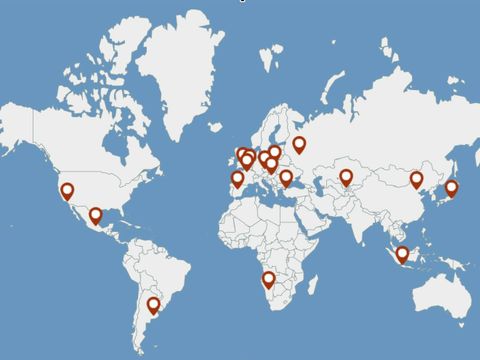The federal state of Berlin maintains partnerships with 18 cities from all over the world, most of which date back to the period shortly before and after German reunification in 1990.
Our partner cities are Beijing, Brussels, Budapest, Buenos Aires, Istanbul, Jakarta, Kyiv, London, Los Angeles, Madrid, Mexico City, Moscow, Paris, Prague, Tashkent, Tokyo, Warsaw, and Windhoek. Along with our official city partnerships, we cooperate with many other cities on specific projects.
In our globalized world, major cities with strong international connections are playing an ever greater role as economic, infrastructural, scientific, academic, and cultural hubs. They all face similarly complex challenges with regard to their infrastructure and in many areas of society, and these challenges require a multi-faceted response.
In a “global city” context, Berlin’s ties to cities around the world provide institutional support for the internationalization of Berlin’s economy and its scientific and academic institutions. The arts and cultural exchanges with our partner cities also receive active support. Along with the official elements of our cooperation, which includes reciprocal visits by political representatives, Berlin is particularly interested in having the people of the city benefit directly from our partnerships. Against this backdrop, contacts between the people and their representatives, between political and social groups, and between municipal and private organizations are especially encouraged. We hold seminars for specialists and senior staff, and we also support cultural, academic, scientific, and sporting events, youth exchanges, and study abroad programs. As the capital of the EU’s most populous member state and a youthful, attractive city, Berlin holds a lot of appeal for major cities around the world as a potential cooperation partner. The focus of each exchange is chosen on the basis of Berlin’s interests and those of the partner city. Although they vary from city to city, exchanges are currently concentrated on business, science and academics, culture, youth exchanges, and the judiciary.Because all of the 18 city partnerships, as well as cooperation with others on specific projects, cannot be pursued with the same intensity in every possible area, it is crucial that as many people as possible be brought into partnership activity through networks and that contact people be identified. This can be done by including all active and relevant stakeholders in Berlin and its partner cities in the planning for a given project. Along with many different institutions in Berlin, federal government institutions also serve as partners and help give municipal cooperation a strong foundation.
Only this approach makes it possible to encourage existing, planned, or new activities and bring them into the city partnership framework, thereby increasing their effectiveness for both partners.
Information on the individual city partnerships can be found on the pages linked to the names of the partner cities below.

